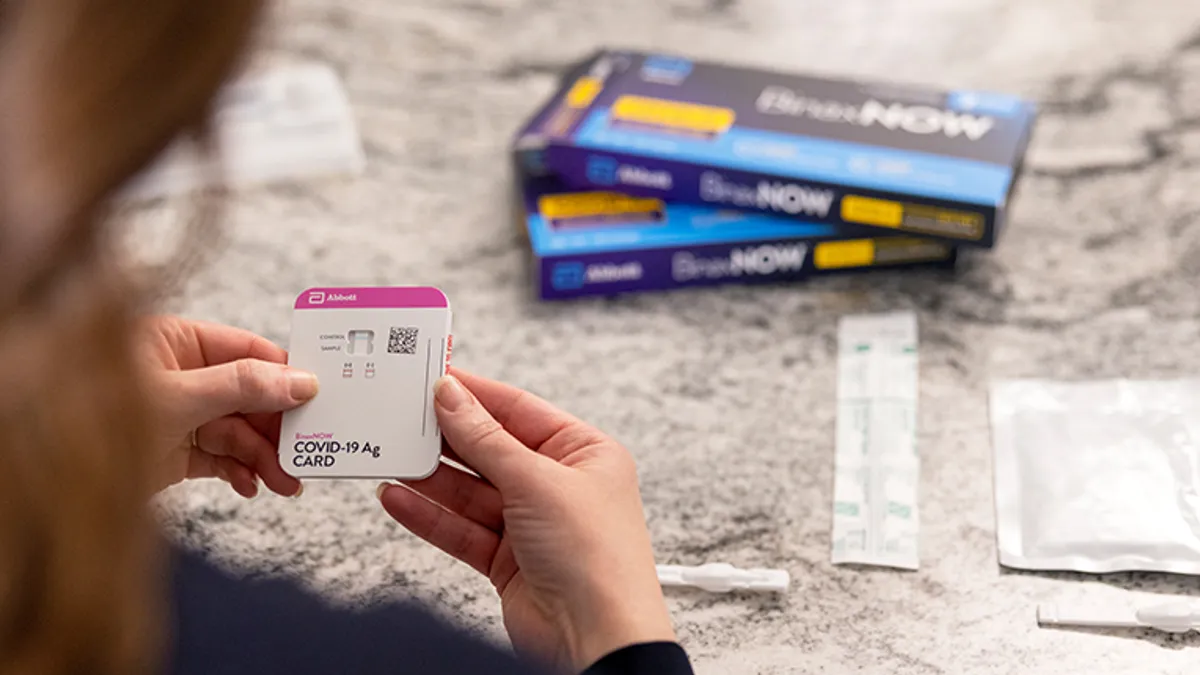What goes up must come down is an adage ringing true this week for Abbott Laboratories, as it cut its 2021 outlook blaming a sharp decline in demand for its coronavirus-related tests on global vaccination efforts.
The industry has recently reported a softening in demand for COVID-19 tests due to vaccines, with sales at other diagnostic companies such as BD, Qiagen and Quidel falling short of analyst expectations in their latest earnings. Still, Abbott's slashing its guidance could be a harbinger that those warnings don't go far enough.
Abbott CEO Robert Ford told investors Tuesday it had no way of knowing in April when it reported first-quarter earnings that market dynamics would change so dramatically in subsequent weeks. At that time, Ford said Abbott was seeing coronavirus case rates holding steady in the U.S. and other major developed countries. However, in May, the test maker experienced a "sudden" and fundamental drop-off in demand for COVID-19 testing, particularly for screening and surveillance with rapid testing.
"While we've always said the demand for COVID testing sales would eventually work its way to a flu-like level, we couldn't have anticipated what has occurred over the past several weeks," Ford told investors on Tuesday's conference call.
Abbott now forecasts about $4 billion to $4.5 billion in COVID-19 testing sales in 2021, including second-quarter sales of around $1.1 billion. The company previously forecasted about $6.5 billion to $7 billion in coronavirus test sales on its fourth-quarter earnings call in late January.
Looking beyond 2021, SVB Leerink analysts Tuesday wrote that "given that the new guidelines might eliminate the end-user demand effectively" they slashed their 2022 Abbott COVID-19 testing revenue estimate of about $3.5 billion to $4 billion to approximately $300 million.
Jefferies analysts also now forecast $300 million of overall COVID-19 testing in 2022 based on their assumption of a "faster drop to a normal-like seasonal flu trend."
News of the plummet in test demand and the company’s decision to cut its 2021 outlook sent Abbott's stock down more than 9% yesterday, while Quidel's share price dropped more than 7% in reaction.
Quidel CEO Doug Bryant on a recent earnings call said uncertainty in the COVID-19 testing market is the reason his company "will not be giving guidance on revenue or capacity."
Qiagen in May similaly braced investors for increased volatility in COVID-19 testing as the new phase of the pandemic progresses.
Speaking on Wednesday at the Jefferies Virtual Healthcare Conference, Qiagen CEO Thierry Bernard said the demand for coronavirus-related tests will continue probably until the second quarter of 2021 and then start to plateau and decline.
"True, in some geographies, it went down quicker than expected but in other geographies it has stayed pretty stable longer than expected," Bernard said. "The U.S. has seen a sharper, quicker decline than expected ... Europe is still quite strong in COVID testing demand as are the emerging countries."
J.P. Morgan analysts claimed there were hints of the bombshell news.
"We started to see cracks on 1Q call, with vaccination campaigns around the world and updated CDC guidance eliminating the need for most testing with vaccinated patients; so, we aren't terribly surprised to see Abbott cut its expectations here," J.P. Morgan analysts wrote.
The analysts pointed out that with daily new COVID-19 cases down more than 60% in the U.S. since mid-April and the rollout of vaccines in developed countries, the trend over the past few weeks is expected to continue with vaccination rates driving cases even lower.
Despite the precipitous decline in testing demand, J.P. Morgan analysts contend that Abbott is one of the best positioned medtechs to weather the ongoing pressure. Indeed it is less reliant on COVID testing than a company like Quidel.
"The company’s business is split evenly between more traditional medtech and hospital end markets like cardiovascular and more consumer-oriented franchises like diabetes. This leaves Abbott far less exposed to deferrable procedures than peers, something that makes the name far more attractive in today’s environment, where deferrable procedures continue to be postponed," the analysts concluded.











